| Srl | Item |
| 1 |
ID:
167187
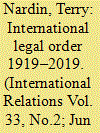

|
|
|
|
|
| Summary/Abstract |
Despite repeated claims during the past century that the international legal order has been radically transformed, the contours of that order are in many ways the same in 2019 as they were in 1919. New laws govern international institutions, human rights, trade, and the environment and new institutions have emerged that affect how international law is interpreted and applied. War has lost legitimacy as a tool of foreign policy and individual responsibility for aggression and crimes against humanity has been affirmed. Yet these changes build on ideas and practices that may have been rudimentary but were not absent a century ago. Underlying them are persistent differences involving a shifting cast of old and new states as well as differences between local and universal ideals and between instrumental and noninstrumental conceptions of law. The traditional understanding of state sovereignty on which the international legal order rests has been qualified but not discarded, and its persistence confirms that the system it orders remains a system of states.
|
|
|
|
|
|
|
|
|
|
|
|
|
|
|
|
| 2 |
ID:
069767


|
|
|
| 3 |
ID:
155784
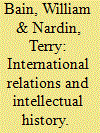

|
|
|
|
|
| Summary/Abstract |
The history of international thought has traditionally focused on a limited number of canonical texts. Such an approach now seems both naive and parochial. International Relations scholars often read their own ideas into these texts instead of getting ideas from them – ideas that if properly understood have the potential to undermine theirs. By ignoring non-canonical texts, we overlook resources that are not only necessary to establish the historical contexts of canonical writings but that can also help theorists of International Relations to understand their subject better. Judgements of what is and is not canonical are in any case themselves context-bound and contestable. Intellectual history can help us understand how the International Relations canon was constructed and for what purposes. It can also counter the abstractions of theory by reminding us not only that theories are abstractions from the activities of people living in particular times and places but also that our own theories are embedded in historicity. In these and other ways, paying attention to intellectual history expands the repertoire of ideas on which International Relations theorists can draw and against which they can measure their conclusions. The articles in this issue illustrate these points in relation to a wide range of texts and contexts. They suggest that whether one approaches international relations from the angle of description, explanation, policy or ethics, knowing how past thinkers have understood the subject can lead to better informed and more robust scholarship.
|
|
|
|
|
|
|
|
|
|
|
|
|
|
|
|
| 4 |
ID:
050822
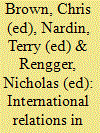

|
|
|
|
|
| Publication |
Cambridge, Cambridge University Press, 2002.
|
| Description |
xii, 617p.
|
| Standard Number |
0521575702
|
|
|
|
|
|
|
|
|
|
|
|
Copies: C:1/I:0,R:0,Q:0
Circulation
| Accession# | Call# | Current Location | Status | Policy | Location |
| 047825 | 327/BRO 047825 | Main | On Shelf | General | |
|
|
|
|
| 5 |
ID:
108476
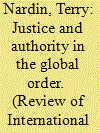

|
|
|
|
|
| Publication |
2011.
|
| Summary/Abstract |
The global justice debate has largely ignored law. But that debate presupposes a legal order within which principles of justice could be implemented. Paying attention to law alters our understanding of global justice by requiring us to distinguish principles that are properly prescribed and enforced within a legal order from those that are not. Given that theories of global governance depreciate law and that cosmopolitan and confederal theories are utopian, the most promising context for a realistic global justice discourse is one that is focused on strengthening, not transcending, the international legal order.
|
|
|
|
|
|
|
|
|
|
|
|
|
|
|
|
| 6 |
ID:
155792
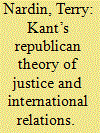

|
|
|
|
|
| Summary/Abstract |
Kant’s primary concern in writing on international relations is how to achieve ‘justice’ (Recht) between states. This means that instead of reading Kant as a theorist of peace or world government, as IR theorists have usually done, he is better read as a theorist international justice. His view of justice, which identifies it with a legal order that respects freedom as independence or nondomination, is broadly republican. But he equivocates on the possibility of justice at the international level, and this narrows what is usually seen as a wide gap between Kant’s thought and political realism. The paradox his uncertainty reveals is that it is wrong for states to remain in a lawless condition yet impossible for them to escape it so long as they remain independent. An international order cannot generate genuine law because there are no institutions to make, interpret, or enforce it. This means that states are entitled to determine their own foreign affairs. The gap between sovereignty and justice cannot be closed so long as these ideas are defined as they are within the state. The problem is not that a full, secure, and nonvoluntary system of justice that preserves the sovereignty of states is contingently unlikely. It is conceptually impossible. This conclusion poses a challenge to current theories of global justice.
|
|
|
|
|
|
|
|
|
|
|
|
|
|
|
|
| 7 |
ID:
183404
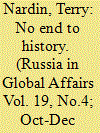

|
|
|
| 8 |
ID:
082193
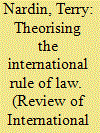

|
|
|
|
|
| Publication |
2008.
|
| Summary/Abstract |
Recent trends in international law scholarship recycle objections to international law advanced by an earlier generation of political and legal realists. Such objections fail to understand the place of international law in the global order. To understand that place, we must distinguish the idea of the rule of law from other understandings of law. That idea is an inherently moral one. Theories of international law that ignore the moral element in law cannot distinguish law as a constraint on power from law as an instrument of power. A Kantian theory of international law can help to recover that moral element
|
|
|
|
|
|
|
|
|
|
|
|
|
|
|
|